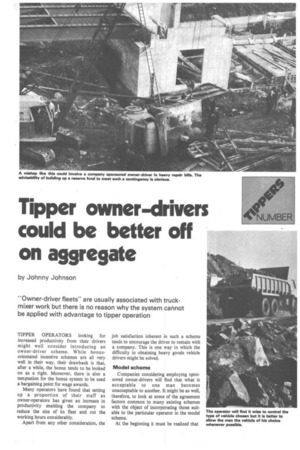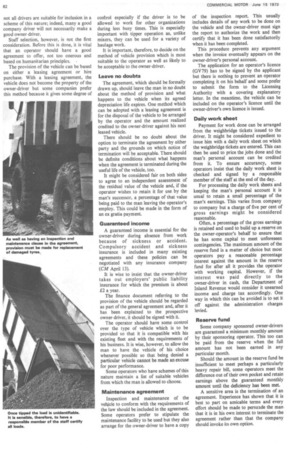Tipper owner-drivers could be better off on aggregate
Page 83

Page 84

If you've noticed an error in this article please click here to report it so we can fix it.
by Johnny Johnson "Owner-driver fleets" are usually associated with truckmixer work but there is no reason why the system cannot be applied with advantage to tipper operation
TIPPER OPERATORS looking for increased productivity from their drivers might well consider introducing an owner-driver scheme. While bonusorientated incentive schemes are all very well in their way, their drawback is that, after a while, the bonus tends to be looked on as a right. Moreover, there is also a temptation for the bonus system to be used a bargaining point for wage awards.
Many operators have found that setting up a proportion of their staff as owner-operators has given an increase in productivity enabling the company to reduce the size of its fleet and cut the working hours considerably.
Apart from any other consideration, the job satisfaction inherent in such a scheme tends to encourage the driver to remain with a company. This is one way in which the difficulty in obtaining heavy goods vehicle drivers might be solved.
Model scheme Companies considering employing sponsored owner-drivers will find that what is acceptable to one man becomes unacceptable to another. It might be as well, therefore, to look at some of the agreement factors common to many existing schemes with the object of incorporating those suitable to the particular operator in the model scheme.
At the beginning it must be realized that not all drivers are suitable for inclusion in a scheme of this nature; indeed, many a good company driver will not necessarily make a good owner-driver.
Staff selection, however, is not the first consideration. Before this is done, it is vital that an operator should have a good agreement to offer, not too onerous and based on humanitarian principles.
The provision of the vehicle can be based on either a leasing agreement or hire purchase. With a leasing agreement, the vehicle does not become the property of the owner-driver but some companies prefer this method because it gives some degree of conlrol especially if the driver is to be allowed to work for other organizations during less busy times. This is especially important with tipper operation as, unlike mixers, they can be used for a variety of haul age work.
It is important, therefore, to decide on the method of vehicle provision which is most suitable to the operator as well as likely to be acceptable to the owner-driver.
Leave no doubts The agreement, which should be formally drawn up, should leave the man in no doubt about the method of provision and what happens to the vehicle when its agreed depreciation life expires. One method which can be adopted with a leasing agreement is for the disposal of the vehicle to be arranged by the operator and the amount realized credited to the owner-driver against his next leased vehicle.
There should be no doubt about the option to terminate the agreement by either party and the grounds on which notice of termination will be acceptable. There should be definite conditions about what happens when the agreement is terminated during the useful life of the vehicle, too.
It might be considered fair on both sides to agree to an independent assessment of the residual value of the vehicle and, if the operator wishes to retain it for use by the man's successor, a percentage of that value being paid to the man leaving the operator's employ. This could be made in the form of an ex gratia payment.
Guaranteed income
A guaranteed income is essential for the owner-driver during absence from work because of sickness or accident. Compulsory accident and sickness insurance is included in many existing agreements and these policies can be negotiated with any insurance company (CM April 13).
It is wise to insist that the owner-driver takes out employers' public liability insurance for which the premium is about £2 a year.
The finance document referring to the provision of the vehicle should be regarded as part of the general agreement and, after it has been explained to the prospective owner-driver, it should be signed with it.
The operator should have some control over the type of vehicle which is to be provided so that it is compatible with his existing fleet and with the requirements of his business. It is wise, however, to allow the man to have the vehicle of his choice whenever possible so that being denied a particular vehicle cannot be made an excuse for poor performance.
Some operators who have schemes of this nature maintain a list of suitable vehicles from which the man is allowed to choose.
Maintenance agreement Inspection and maintenance of the vehicle to conform with the requirements of the law should be included in the agreement. Some operators prefer to stipulate the maintenance facility to be used but they also arrange for the owner-driver to have a copy of the inspection report. This usually includes details of any work to be done on the vehicle and the owner-driver must sign the report to authorize the work and then certify that it has been done satisfactorily when it has been completed.
This procedure prevents any argument when the invoice eventually appears on the owner-driver's personal account.
The application for an operator's licence (GV79) has to be signed by the applicant but there is nothing to prevent an operator completing it on his behalf and some prefer to submit the form to the Licensing Authority with a covering explanatory letter. In the meantime, the vehicle can be included on the operator's licence until the owner-driver's own licence is issued.
Daily work sheet Payment for work done can be arranged from the weighbridge tickets issued to the driver. It might be considered expedient to issue him with a daily work sheet on which the weighbridge tickets are entered. This can then be used to price the jobs done and the man's personal account can be credited from it. To ensure accurancy, some operators insist that the daily work sheet is checked and signed by a responsible member of the staff at the end of the day.
For processing the daily work sheets and keeping the man's personal account it is usual to retain a small percentage of the man's earnings. This varies from company to company but a charge of five per cent of gross earnings might be considered reasonable.
Often, a percentage of the gross earnings is retained and used to build up a reserve on the owner-operator's behalf to ensure that he has some capital to meet unforeseen contingencies. The maximum amount of the reserve fund is a matter of choice but most operators pay a reasonable percentage interest against the amount in the reserve fund for after all it provides the operator with working capital. However, if the interest was paid directly to the owner-driver in cash, the Department of Inland Revenue would consider it unearned income and charge tax accordingly. One way in which this can be avoided is to set it off against the administration charges levied.
Reserve fund Some company sponsored owner-drivers are guaranteed a minimum monthly amount by their sponsoring operator. This too can be paid from the reserve when the full amount has not been earned in any particular month.
Should the amount in the reserve fund be insufficient to meet perhaps a particularly heavy repair bill, some operators meet the difference out of their own pocket and retain earnings above the guaranteed monthly amount until the deficiency has been met.
A sensitive area is the termination of an agreement. Experience has shown that it is best to part on amicable terms and every effort should be made to persuade the man that it is in his own interest to terminate the agreement rather than that the company should invoke its own option.












































































































































